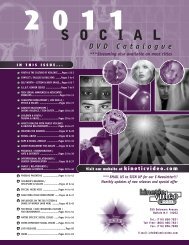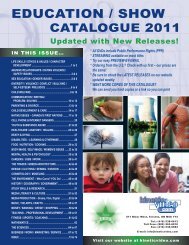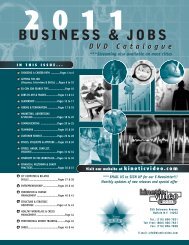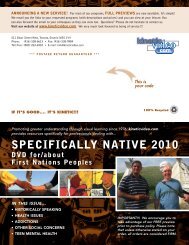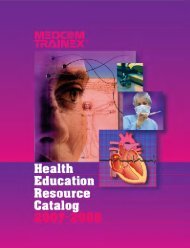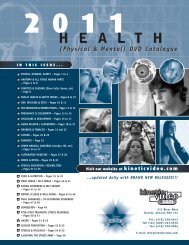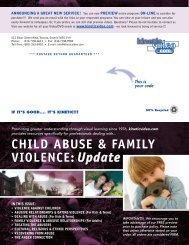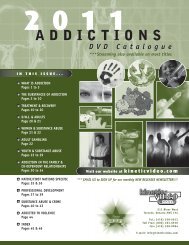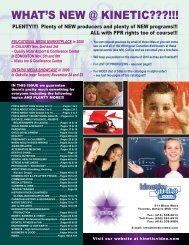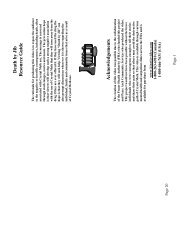WHAT'S NEW @ KINETIC???!!! - Kinetic Video
WHAT'S NEW @ KINETIC???!!! - Kinetic Video
WHAT'S NEW @ KINETIC???!!! - Kinetic Video
You also want an ePaper? Increase the reach of your titles
YUMPU automatically turns print PDFs into web optimized ePapers that Google loves.
ENCOUNTER GROUPS FOR ADDICTIONS<br />
Encounter groups are at the heart of therapeutic communities. They demonstrate a break from traditional addiction<br />
counseling techniques and have been proven to be an effective and important means for change. However, institutional<br />
demands including increased paperwork and funding cuts have recently threatened the livelihood of encounter groups. In this<br />
series, Rod Mullen creates a strong argument for how and why we need to keep the encounter group thriving. Illustrated with<br />
powerful and compelling vignettes from actual encounter groups, these videos explore how encounter groups have evolved,<br />
what we can do to improve groups and overcome pitfalls, and what the keys are to leading successful groups.<br />
Volume 1: EVOLUTION OF THE ENCOUNTER GROUP<br />
Mullen explores the evolution of encounter groups beginning with the first groups created by Synanon founder Chuck Dederich<br />
in the 1950s. Mullen discusses the essential elements of these first groups including honesty, authenticity and mutual selfhelp-elements<br />
that are still core to encounter groups today. He highlights that although the brutal confrontational style of<br />
the first groups have softened, the commitment to hold oneself and other accountable remains central. He also discusses the<br />
challenges that face encounter groups and offers guidance on how to work within managed care systems while holding on to<br />
the traditions that make encounter groups such an effective means for change. 65 minutes<br />
Volume II: PITFALLS AND SOLUTIONS<br />
Mullen walks us through several groups to show us what works and what does not work when facilitating an encounter group.<br />
He warns us of several traps facilitators can fall into: dominating the group, getting into power struggles, not being prepared<br />
or knowing the group members, and leading groups that are too large and don't go deep enough. Through numerous<br />
vignettes, he illustrates solutions to these common problems, and offers words of experience and wisdom to the encounter<br />
group facilitator: know your people, be prepared, get feedback, and listen, listen, listen! 75 minutes<br />
Volume III: KEYS TO FOSTERING GROWTH<br />
Mullen discusses several key components to fostering growth and change in groups. He first explores the "marathon group"<br />
and how these day or weeklong sessions can bring participants into deeper understanding of themselves and what they need<br />
to change. He then discusses the importance of moral growth and ways in which facilitators can lead groups to foster it by<br />
providing credible role models, healthy levels of conflict, role-reversal, and the teaching of responsibility. Finally, Mullen<br />
discusses the prevalence of PTSD among addicts and how encounter groups offer opportunities to heal from childhood abuse.<br />
#12824/1745 Three 65-75 minute Programs 2009 $169.95 each or Series $379.95<br />
OLDER ADULTS AND ADDICTION<br />
(Clinical Innovators Series)<br />
By the year 2020, SAMHSA expects over a 60% increase in<br />
people aged 50 and over needing substance abuse<br />
treatment. Compared to adults whose drug use began in<br />
the 1960s, this future audience faces an increased risk of<br />
comorbid diseases and mental health consequences.<br />
Perhaps the nation's leading authorities on this client<br />
population, Frederic Blow and David Oslin present<br />
evidence-based strategies found in SAMHSA's promising<br />
practices. This program is essential for treatment centers,<br />
nursing homes, and community service centers. *Includes<br />
a 104-page Clinician's Manual written by Blow and Oslin<br />
and a test that allows you to earn continuing education<br />
contact hours. #11321/0795 35 minutes 2007 $219.95<br />
WOMEN AND ADDICTION: A Gender<br />
Responsive Approach (Clinical Innovators)<br />
Women's treatment involves more than simply providing<br />
women-only group settings. Program content, staff<br />
selection, and even site selection are all components of<br />
an environment in which gender-responsive treatment<br />
thrives. In this program, Stephanie S. Covington explains<br />
how to create effective recovery services for women and<br />
girls; services that reflect an understanding of the<br />
realities of their lives and address their unique challenges<br />
and strengths. Dr. Covington's comprehensive, integrated<br />
approach is based on years of theory, research, and<br />
clinical experience. *Includes a video workshop on DVD, a<br />
104-page clinician's manual written by Covington<br />
#11304/0795 75 minutes 2007 $219.95<br />
APPLYING ASAM PLACEMENT CRITERIA (Clinical Innovators Series)<br />
The need for standardized client care was recognized in 1991, when the American Society of Addiction Medicine published its<br />
Patient Placement Criteria for treating psychoactive substance use disorders. The newly revised ASAM-PPC-2R manual takes<br />
on renewed importance with today's emphasis on evidence-based practice. David Mee-Lee presents a clear and concise<br />
overview of the new ASAM criteria. *Includes a video workshop on DVD, a 104-page clinician's manual written by Mee-Lee and<br />
Tomlin and a test that allows you to earn 10 continuing education hours. #11303/0795 75 minutes 2007 $219.95 *CC<br />
CRIMINOLOGY & LIFE AFTER PRISON<br />
THE <strong>NEW</strong> ASYLUMS - Emmy Nominated! There are nearly half a million mentally ill people serving time in prisons and<br />
jails. As sheriffs and prison wardens become the unexpected and ill-equipped gatekeepers of this burgeoning population, they<br />
raise a troubling new concern: are jails and prisons our new asylums? FRONTLINE goes inside the prison system to present a<br />
searing exploration of the complex and growing topic of mental health behind bars.<br />
#12788/1725 60 minutes 2005 $129.95 *CC<br />
THE RELEASED - In this follow up to the groundbreaking film The New Asylums, FRONTLINE examines what happens to the<br />
mentally ill when they leave prison and why they return at such alarming rates. The intimate stories of the released, along<br />
with interviews with parole officers, social workers, and psychiatrists, provide a rare look at the lives of the mentally ill as<br />
they struggle to stay out of prison and reintegrate into society. #12789/1725 60 minutes 2009 $129.95 *CC<br />
55



